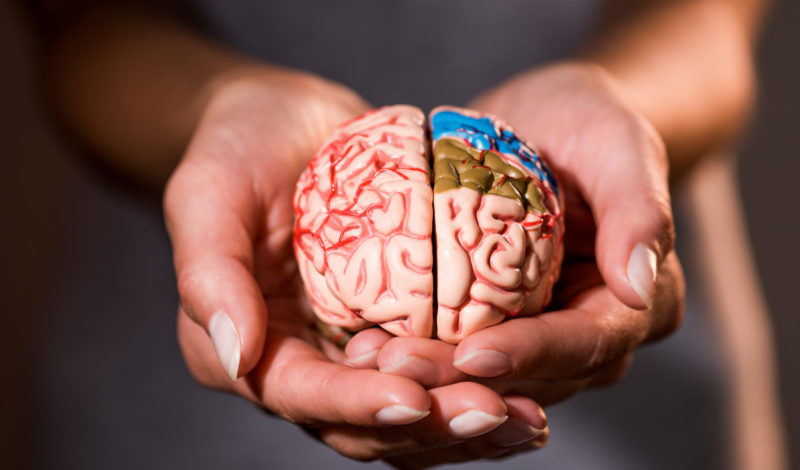The intestine can digest much more than "just" food: A network of around 100 million nerve cells runs through the entire gastrointestinal tract and [...]

Microbiome vs. depression: How intestinal bacteria help you
Love literally goes through the stomach. Or better said, through the intestines, because intestinal bacteria influence the mood. Or have you never felt like you were on cloud nine while eating?
Numerous studies have shown in the past that the intestine and the psyche are connected. There is now even talk that the microbiome can promote or even prevent depression. While a deficiency of certain intestinal bacteria promotes depression, a targeted colonisation of certain intestinal bacteria can sometimes help against depression. How closely the microbiome and our state of mind are linked has become a promising focus of current research.
How does the lack of certain intestinal bacteria promote depression?
According to research, the fact that hunger can sometimes make you angry is mainly due to the falling blood sugar level. But the intestinal flora can also influence our mood. Researchers have been talking about a so-called intestinal-brain axis for quite some time. In plain language this means that your gastrointestinal tract communicates with your brain.
The hundred trillion bacteria in the intestines not only digest food. According to researchers at Cork University, they are also involved in building substances that act on your nervous system. According to the associated study, intestinal bacteria act as building blocks for messenger substances such as serotonin, GABA and dopamine. The first substance is a happiness hormone, over 95 percent of whose components come from the intestine – more precisely from the intestinal bacteria species Bifidobacterium infantis, which, like other tryptophane-forming bacteria, is one of the “good” types of bacteria. How many of these positive bacteria colonise the intestine is entirely individual. The more there are, the more serotonin the body produces. You notice this in high motivation, well-being and mood highs. If, on the other hand, you only have a few tryptophane-producing intestinal bacteria, your intestinal flora could promote depression.
Which intestinal bacteria could help against depression?
Recent studies by the Catholic University of Leuven in Belgium also investigated the relationship between microbiom, our brain and behaviour. The differences in stool were analysed in over 2,000 healthy and depressed people. The results suggest that certain intestinal bacteria may help against depression. At least there was a deficiency of the bacterial species in the intestines of depressive people:
- Coprococcus
- Dialister
- Faecalibacterium
The Belgian studies also concluded that the genes of certain intestinal bacteria are involved in the formation of the messenger substance GABA. Others, however, degrade the signaling substance dopamine. On the basis of disturbances of the intestinal flora, depression and other mental ailments may in future perhaps be recognised at an early stage and thus treated specifically. Whether the lack of intestinal bacteria actually triggers the depression or whether more intestinal bacteria die as a result of a depression is to be clarified in follow-up studies.
Although there is still a need for studies, at least an interaction between microbiome and brain is considered proven. You can find out how balanced your intestinal bacteria are. Depression cannot be diagnosed directly from the composition of your personal microbiome, but it is still worthwhile. It has been proven that a balanced intestinal flora is good for body and mind. That is why you should rather recognize any deficiency symptoms early on. Afterwards, you can strengthen the population of positive intestinal bacteria through a targeted supply of appropriate food – the psyche will thank you for it.
- Sources:
- Wang, H., Lee, I. S., Braun, C., & Enck, P. (2016). Effect of Probiotics on Central Nervous System Functions in Animals and Humans: A Systematic Review. Journal of neurogastroenterology and motility, 22(4), 589–605. https://doi.org/10.5056/jnm16018
- Wallace, C., & Milev, R. (2017). The effects of probiotics on depressive symptoms in humans: a systematic review. Annals of general psychiatry, 16, 14. https://doi.org/10.1186/s12991-017-0138-2
- Akkasheh, G., Kashani-Poor, Z., Tajabadi-Ebrahimi, M., Jafari, P., Akbari, H., Taghizadeh, M., Memarzadeh, M. R., Asemi, Z., & Esmaillzadeh, A. (2016). Clinical and metabolic response to probiotic administration in patients with major depressive disorder: A randomized, double-blind, placebo-controlled trial. Nutrition (Burbank, Los Angeles County, Calif.), 32(3), 315–320. https://doi.org/10.1016/j.nut.2015.09.003
- Strandwitz, P., Kim, K.H., Terekhova, D. et al. (2019) GABA-modulating bacteria of the human gut microbiota. Nat Microbiol 4, 396–403. https://doi.org/10.1038/s41564-018-0307-3
- Dhakal, R., Bajpai, V. K., & Baek, K. H. (2012). Production of gaba (γ – Aminobutyric acid) by microorganisms: a review. Brazilian journal of microbiology : [publication of the Brazilian Society for Microbiology], 43(4), 1230–1241. https://doi.org/10.1590/S1517-83822012000400001
- Yunes, R. A., Poluektova, E. U., Dyachkova, M. S., Klimina, K. M., Kovtun, A. S., Averina, O. V., Orlova, V. S., & Danilenko, V. N. (2016). GABA production and structure of gadB/gadC genes in Lactobacillus and Bifidobacterium strains from human microbiota. Anaerobe, 42, 197–204.
- Cryan JF, Dinan TG. Mind-altering microorganisms: the impact of the gut microbiota on brain and behaviour. Nature Reviews Neuroscience 2012:13, 701–712, https://www.nature.com/articles/nrn3346
- Valles-Colomer M, Falony G, Darzi Y, et al. The neuroactive potential of the human gut microbiota in quality of life and depression. Nature Microbiology 2019:4, 623-632, https://www.nature.com/articles/s41564-018-0337-x



